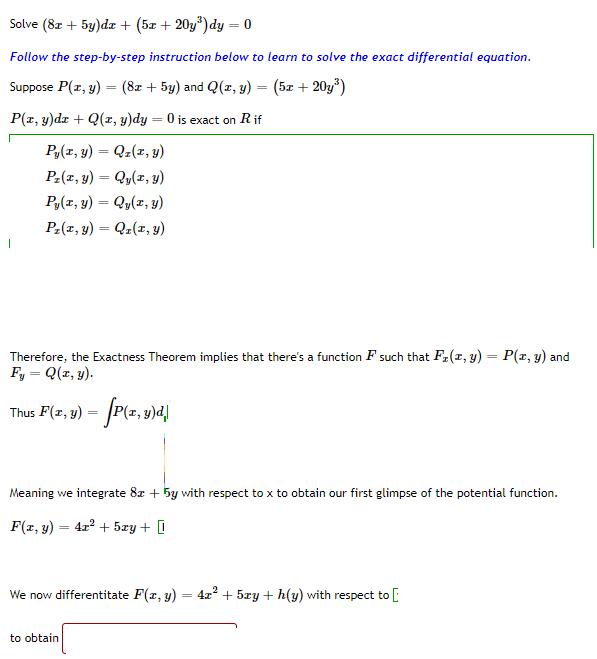Question
Solve (8x + 5y)dx + (5x + 20y)dy = 0 Follow the step-by-step instruction below to learn to solve the exact differential equation. Suppose

Solve (8x + 5y)dx + (5x + 20y)dy = 0 Follow the step-by-step instruction below to learn to solve the exact differential equation. Suppose P(x, y) = (8x + 5y) and Q(x, y) = (5x + 20y) P(x, y)dx + Q(x, y)dy = 0 is exact on Rif Py(x, y) = Qz(x, y) Pz(x, y) = Qy(x, y) Py(x, y) = Qy(x, y) Pz(x, y) = Q(x, y) Therefore, the Exactness Theorem implies that there's a function F such that F(x, y) = P(x, y) and Fy = Q(x, y). Thus F(x, y) = P(x, y)d Meaning we integrate 8x + 5y with respect to x to obtain our first glimpse of the potential function. F(x, y) = 4r + 5ay + [ We now differentitate F(x, y) = to obtain 4x + 5xy + h(y) with respect to [
Step by Step Solution
3.34 Rating (154 Votes )
There are 3 Steps involved in it
Step: 1
2 811 dan have 8x 5y Px y differentiate Px y 5 P We Take We 8x 5y dx 5x 20y dy 0 W but Integrate ...
Get Instant Access to Expert-Tailored Solutions
See step-by-step solutions with expert insights and AI powered tools for academic success
Step: 2

Step: 3

Ace Your Homework with AI
Get the answers you need in no time with our AI-driven, step-by-step assistance
Get StartedRecommended Textbook for
Calculus Early Transcendentals
Authors: James Stewart
8th edition
1285741552, 9781305482463 , 978-1285741550
Students also viewed these Accounting questions
Question
Answered: 1 week ago
Question
Answered: 1 week ago
Question
Answered: 1 week ago
Question
Answered: 1 week ago
Question
Answered: 1 week ago
Question
Answered: 1 week ago
Question
Answered: 1 week ago
Question
Answered: 1 week ago
Question
Answered: 1 week ago
Question
Answered: 1 week ago
Question
Answered: 1 week ago
Question
Answered: 1 week ago
Question
Answered: 1 week ago
Question
Answered: 1 week ago
Question
Answered: 1 week ago
Question
Answered: 1 week ago
Question
Answered: 1 week ago
Question
Answered: 1 week ago
Question
Answered: 1 week ago
Question
Answered: 1 week ago
Question
Answered: 1 week ago
Question
Answered: 1 week ago
View Answer in SolutionInn App



